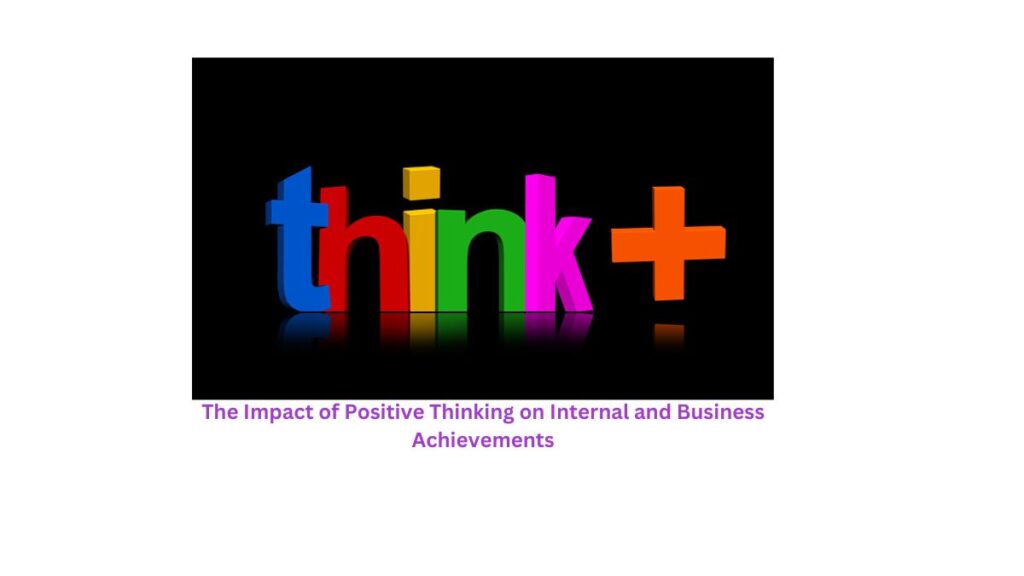Introduction:
“Beyond the Boardroom: The Impact of Positive Thinking on Internal and Business Achievements”

In the dynamic landscape of modern business, success goes beyond the confines of the boardroom. In this SEO-friendly article, we delve into the transformative influence of positive thinking on both internal dynamics and business achievements. Let’s explore how cultivating a positive mindset can pave the way for unprecedented success.
The Impact of Positive Thinking
· Positive thinking acts as a catalyst for success, shaping not only individual attitudes but also the overall internal culture of a business. Learn how fostering optimism within your team can create a resilient and motivated workforce.
· Building a Positive Work Environment: Discover actionable strategies to cultivate a positive work environment that fosters creativity, collaboration, and productivity. From effective communication to employee engagement initiatives, we’ll explore ways to infuse positivity into the workplace.
· Motivation and Goal Attainment: Positive thinking isn’t just a mindset – it’s a driving force behind goal attainment. Explore how maintaining a positive outlook can fuel motivation, enhance decision-making, and propel your business towards its objectives.
· Overcoming Challenges with Positivity: In the face of challenges, a positive mindset becomes a powerful tool. Uncover practical tips on how to navigate setbacks, foster resilience, and turn obstacles into opportunities for growth.
· Customer Relations and Business Success: The impact of positive thinking extends beyond internal dynamics; it significantly influences external factors, including customer relations. Learn how a positive business approach can enhance customer satisfaction, loyalty, and overall success.
How does positive thinking help us to be successful?
Positive thinking can play a significant role in contributing to success in various aspects of life, including personal development, relationships, and professional achievements. Here are several ways in which positive thinking can help individuals achieve success:

- Optimism and Resilience:
- Positive thinking fosters an optimistic outlook, helping individuals see challenges as opportunities for growth rather than insurmountable obstacles.
- It enhances resilience, allowing individuals to bounce back from setbacks, learn from failures, and maintain a forward-looking perspective.
- Improved Mental and Emotional Well-being:
- Positive thinking contributes to improved mental health by reducing stress, anxiety, and depression.
- A positive mindset encourages a focus on gratitude and appreciation, promoting emotional well-being and a more balanced life.
- Enhanced Creativity and Problem-Solving:
- Optimistic individuals are often more creative and open to exploring innovative solutions.
- Positive thinking can lead to a proactive approach to problem-solving, encouraging individuals to find constructive and effective solutions.
- Increased Motivation and Goal Setting:
- Positive thinkers are more motivated to pursue their goals with enthusiasm and persistence.
- A positive mindset helps in setting and achieving realistic and ambitious goals, providing a sense of direction and purpose.
- Stronger Interpersonal Relationships:
- Positivity contributes to better interpersonal skills, fostering healthy and supportive relationships.
- Optimistic individuals tend to be more approachable, empathetic, and collaborative, which can enhance teamwork and social connections.
- Boosted Confidence and Self-Esteem:
- Positive thinking nurtures self-confidence and a positive self-image.
- Confident individuals are more likely to take on challenges, pursue opportunities, and overcome self-doubt.
- Health Benefits:
- Positive thinking has been associated with physical health benefits, including lower blood pressure, improved immune function, and better cardiovascular health.
- A positive mindset can lead to healthier lifestyle choices, such as exercise and a balanced diet.
- Attracting Opportunities:
- Positive individuals often radiate a can-do attitude, attracting opportunities and positive experiences.
- Optimism can create a positive feedback loop, as success and positive outcomes reinforce and strengthen the individual’s positive mindset.
- Improved Decision-Making:
- Positive thinkers are more likely to make rational and constructive decisions, avoiding pessimism-driven hesitation.
- A positive mindset allows individuals to approach decision-making with clarity and a focus on positive outcomes.
- Enhanced Leadership Skills:
- Leaders with a positive mindset inspire and motivate their teams more effectively.
- Positive leaders are often better at navigating challenges, fostering a positive work culture, and achieving long-term success.
It’s important to note that while positive thinking can contribute to success, it is not a cure-all, and a realistic and balanced perspective is essential. A combination of positive thinking, strategic planning, and consistent effort can pave the way for meaningful achievements.
What is the importance of positive attitude?
A positive attitude holds significant importance in various aspects of life, influencing your well-being, relationships, and overall success. Here are some key reasons highlighting the importance of a positive attitude:

- Enhanced Mental and Emotional Well-being:
- A positive attitude is associated with lower levels of stress, anxiety, and depression.
- It contributes to better mental and emotional well-being, fostering a sense of optimism, resilience, and contentment.
- Improved Physical Health:
- Positivity has been linked to better physical health outcomes.
- Positive individuals tend to engage in healthier lifestyle choices, such as regular exercise, a balanced diet, and other health-promoting behaviors.
- Increased Resilience:
- A positive attitude enhances resilience in the face of challenges.
- Rather than becoming overwhelmed by setbacks, individuals with a positive mindset are better equipped to bounce back, learn from experiences, and persevere.
- Better Stress Management:
- Positive thinkers are more adept at managing stress.
- They approach stressful situations with a more balanced perspective, focusing on solutions rather than dwelling on problems.
- Optimism Fuels Motivation:
- Positive individuals tend to be more motivated and proactive.
- A positive attitude fosters a can-do mindset, encouraging individuals to set and pursue goals with enthusiasm and persistence.
- Improved Problem-Solving Skills:
- Positivity is linked to enhanced creativity and effective problem-solving.
- Individuals with a positive attitude are more likely to approach challenges with a solution-oriented mindset, finding innovative and constructive ways to address issues.
- Better Interpersonal Relationships:
- Positive individuals often have stronger and more fulfilling relationships.
- A positive attitude fosters effective communication, empathy, and a collaborative approach, contributing to healthier connections with family, friends, and colleagues.
- Increased Self-Confidence:
- A positive mindset is closely associated with higher levels of self-confidence and self-esteem.
- Confidence empowers individuals to take on challenges, assert themselves, and pursue opportunities with belief in their abilities.
- Attraction of Opportunities:
- Positivity attracts opportunities and positive experiences.
- Those who approach life with optimism are more likely to recognize and seize opportunities, leading to personal and professional growth.
- Leadership Effectiveness:
- Positive individuals are often effective leaders and influencers.
- A positive attitude inspires and motivates others, creating a positive and productive work or social environment.
- Enhanced Mental Agility:
- Positivity contributes to mental flexibility and adaptability.
- Individuals with a positive attitude are more open to new ideas, more willing to embrace change, and better equipped to navigate uncertainties.
- Long-Term Success:
- A positive attitude contributes to long-term success in various endeavors.
- Positivity creates a positive feedback loop, influencing decisions, actions, and outcomes in a way that supports continued growth and achievement.
In summary, a positive attitude is a powerful force that influences your outlook on life, interactions with others, and overall life satisfaction. It acts as a catalyst for personal development, resilience, and success in both professional and personal spheres. Cultivating and maintaining a positive attitude is a valuable investment in your well-being and the quality of your life.
Conclusion:
As we wrap up our exploration, it’s evident that positive thinking is more than just a motivational mantra; it’s a strategic approach to internal and business success. By integrating these insights into your organizational culture, you can propel your team and business beyond the boardroom towards unprecedented achievements. Embrace the power of positivity and watch as it transforms every facet of your professional journey.





